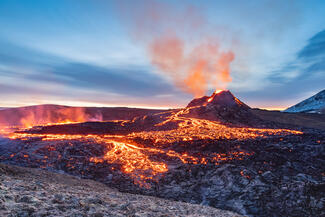Iceland has declared a state of emergency following a volcanic eruption that has damaged key hot water pipes, affecting thousands of residents on the Reykjanes Peninsula. The public has been urged to conserve hot water and electricity as repairs could take days. The eruption, marking the third on the peninsula since December, has raised concerns about the potential impact on other vital pipelines near the Svartsengi power station.
A new 3km-long fissure has been observed, spewing lava high into the air, with smoke visible from Reykjavik, approximately 40km away. The Blue Lagoon, one of Iceland's top tourist attractions, has been forced to close due to the lava flows and is expected to remain shut on Friday.
Efforts are underway to ensure the hot water supply for over 20,000 people is maintained, with schools in affected areas remaining closed. Keflavik Airport has also been impacted, though services are running as usual.
The eruption's intensity is reportedly decreasing, according to the Icelandic Meteorological Office. This event is part of a series of eruptions involving lava pouring from fissures, rather than explosive volcanic activity that sends ash into the atmosphere.
Icelandair has stated that the ongoing eruption will not cause disruptions at Keflavik airport but is closely monitoring the situation.
Iceland, with 33 active volcano systems, sits atop the Mid-Atlantic Ridge. The recent eruptions suggest the Reykjanes Peninsula may be entering a new era of volcanic activity, potentially lasting for many years or even centuries.


